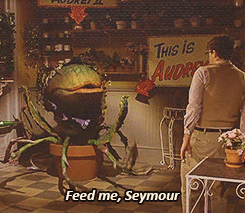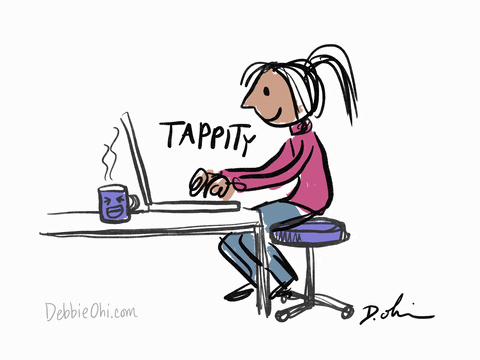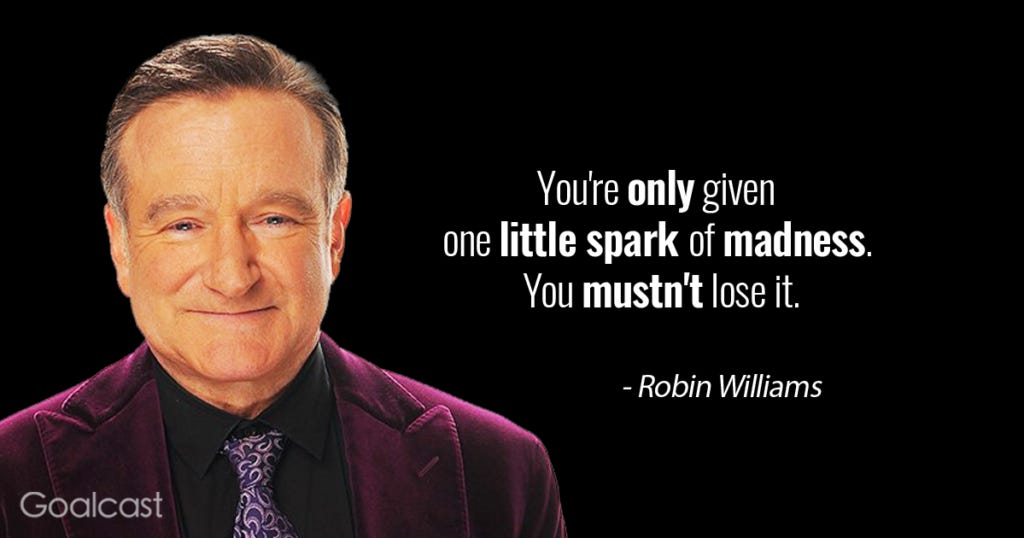Fair warning: I’m feeling a bit ranty.
I don’t know who came up with the term “content creator,” but I’ll bet it was some overpaid guy in an ill-fitting suit who was trying to impress someone even more overpaid. Like those empty suits, “content creator” is an empty phrase. It takes up space without actually saying anything at all.
It’s kin to terms like “job creator,” which is also frustratingly generic and meaningless. Has anyone ever actually sat down and consciously said, “I shall now create jobs out of nothing more than my imagination and a pile of money, and the people will laud me for it and I will be discussed on the news”? No. And in the same way, I don’t believe anyone has ever seriously sat down and consciously said, “I shall now create some content.”
Granted, in the age of “content creation,” that’s exactly what’s being encouraged, but I have trouble believing that anyone can really take that term seriously when they’re being creative. The term is the antithesis of both the creative process and an insult to the people who engage in it, because it turns art of any kind into a commodity to be spit out like widgets for other people to consume in exchange for whatever pittance each click or view offers in return.
The very last thing I ever want to be called is a “content creator.” Every time I encounter the term my whole body tightens up. It’s a concept thoroughly devoid of soul that strips out any sort of respect or admiration for those who do the creating—and, indeed, it strips out the very idea that there’s a person doing the creating at all. There’s no understanding or respect (dare I say reverence?) for the fact that creativity requires a connection and communion with something larger than ourselves, without which it cannot do what art does best: reflect our experience back to us in a new and worthwhile way.
Sure, I write this Substack, have published a novel, and put out a podcast episode every week, but if someone comes up to me and dares to insult any of that work by calling it “content,” or me a “content creator,” I would really have to fight the temptation to clobber them. The English language has perfectly good terms for all these things: novelist, writer, podcaster, interviewer. There’s no need or reason to take vibrant, meaningful language and reduce it to nonsensical twaddle except to be reductive and dismissive of both the work and the person who created it.
There’s a distinct difference between “creative” and “creator.” “Creative” is an adjective, though sometimes we use it as a noun, with “person” understood. It describes a person or a type of activity, and conjures images of color and light, wordplay, dance, vibrance, imagination run amok, something magical happening on a plane above our normal existence. “Creator,” in this usage, is a noun. It’s an impersonal title that lands with a thud, plodding along in a bad faith attempt to mimic the energy of “creative” while actually focusing on profit and consumption.
And, of course, nowhere in the land of the “content creator” does the word “artist” appear in any way, shape, or form. Musicians, dancers, photographers, sculptors, poets, actors, playwrights, painters, costume designers, philosophers… all are commodified and assimilated into this one generic, capitalist-friendly term that pleases only tax accountants and statisticians. It takes no effort to imagine the evil smirks and devilish hand gestures of the men behind this curtain.
Would you ever dream of calling John Lennon and Paul McCartney “content creators”? Of course not. Even if they did famously say “Let’s write a swimming pool,” Lennon and McCartney have always been musicians, and always the real deal. They may have known they had the capacity to write something that would allow them to buy that pool, but they also knew it had to come from a place of real, honest creative energy—artistic integrity—or it would never connect with enough people to buy them a sausage roll.
“Content creator” is a recent term, one brought to us largely by Big Tech, specifically social media. Cory Doctorow talks about the “enshittification” of tech platforms, from social media sites to Amazon. (I know this may look like a tangent, but stick with me.)
Here is how platforms die: first, they are good to their users; then they abuse their users to make things better for their business customers; finally, they abuse those business customers to claw back all the value for themselves. Then, they die.
Facebook is the granddaddy of this process—it offered small businesses reach beyond their wildest dreams when it first opened to the general public, for instance, and has since made it impossible to attain that reach without significant advertising expense. Now it’s struggling to stay relevant, and a lot of us are eagerly awaiting its demise. Elon Musk has taken this concept to bizarre new lows over the last year in his quest to force Twitter to turn big profits by trying to coerce users into staying—or paying—in weird ways that have only served to destroy it. (It’s worth reading Doctorow’s whole post if you’re curious about this idea.)
I don’t think it’s a coincidence that “content” and “content creator” are terms that largely come to us from these same platforms. The terms, and the platforms, are leading the charge in the enshittification of the creative life and process. They take creative people, build them up for a bit on a platform (TikTok immediately springs to mind, since it pioneered use of the term “creator,” but it’s certainly not the only one), turn them into the product once those folks have started to think they might be able to make some sort of income from their work, and continue to make things worse and worse for those folks in the name of platform profit.
Honestly, now that I’ve written it out like that, I’d swear it was the plot of a cautionary Doctor Who episode, but no. If only it were.
It doesn’t stop there, either, because these platforms are relentless beasts that constantly demand to be fed. I played around with TikTok two years ago. It was fun at the beginning, but the massive pressure to keep producing new stuff meant the fun wore off in a hurry.
TikTok became a chore within a matter of weeks—if it took that long. All the platforms have become that way for me (except Substack, which, at least so far, has a different enough vibe, and one that I sincerely hope manages to avoid this pattern). Content creation’s relentless churn turns creative folks into trained poodles jumping through hoops to make algorithms—and, potentially, followings—happy.
I’m sure there are folks who have a natural talent for this sort of media, or have found ways to make it more fun for themselves, but unless you’ve managed to build a community you really love, and potentially even then, you’re still part of the machine, working for it at least as much as it’s working for you.
I should also note that there are people who have managed to make the whole thing succeed for them. TikTok has launched artistic careers for a lot of people, and I am genuinely thrilled for them. But they remain the exception rather than the rule, and the trend is the alarming thing, especially as TikTok is no longer new and is therefore further along the enshittification process. It was easier to become a viral hit there several years ago than it is now, so if you missed the moment, well, too bad.
And this is before we even consider the idea of creative work as “content”—a term that has bothered me since I first heard it used regularly as a specific term rather than the general “table of contents” or “the contents of your suitcase.” I couldn’t figure out what it meant. Now that I know, it still doesn’t sit well. I cringe when I see job listings for things like “content writer”—once upon a time, and here I mean all of a decade ago, it would just have been (heavens!) “writer” or “sports writer” or “science writer” or “marketing writer” or whatever other kind of writer someone needed. Now almost all writing outside of book publishing has been demoted to generic, meaningless “content.” It’s just words meant to be consumed by humans who hoover up text as they mindlessly scroll through their days.
Actress Emma Thompson just this week commented on “content” while discussing the current state of affairs for striking actors and writers. “To hear people talk about ‘content’ makes me feel like the stuffing inside a sofa cushion. ‘Content,’ what do you mean, ‘content’? It’s just rude, actually. It’s just a rude word for creative people.” She goes on to say that algorithms that drive the “content” don’t work, because they produce substandard results rather than art that’s capable of moving us—and she’s not wrong. (Stumbling on this piece is what inspired me to finally get my thoughts on this topic down, though I decided to write first and read after.)
It’s not just writers and actors, of course, but being a writer myself, that’s where I’ve seen the most “content,” and my eyes glaze over just at the thought of it. The writing field used to be generally referred to as “editorial,” which at least implied some human interaction and thoughtfulness. Editorial departments are now content departments. Editorial directors are now “directors of content.” I’m not even sure what that title means (how exactly does one direct content?), but I feel my creative soul die a little every time I see it, and I can’t figure out why “editorial” and “writing” have suddenly become such dirty words in the corporate world. (I think the answer is in the word “corporate” and its relentless desire to drive meaning and soul from everything it does, but even so, don’t they have to stop somewhere?)
I know those jobs make a lot of money, and plenty of people do them, but I can’t even begin to think about the idea of applying for one. It feels like surrendering to the commodification machine, turning myself into a word-spewing robot. I’ve watched way too much Doctor Who in my life to be okay with that.
The Cybermen in Doctor Who are a race of aliens who started out as ordinary humans, installing things like artificial hearts and lungs until they replaced everything that made them human. I wonder when we will take things too far and realize we’ve managed to dehumanize ourselves without physical replacement parts—our bizarre tendency to deny our humanity by becoming slaves to our own creations (time, social media, algorithms, social constructs), by denying our emotions to save face or appear “professional,” and by telling ourselves we should behave more and more like machines—even though we are not and never will be machines—will have the same result eventually. Generic, dehumanizing terms like “content creator” make me think we might be farther down that road than we realize.
A lot of creative folks have trouble calling themselves artists, musicians, writers, or whatever word applies to their creative pursuits because those terms feel so vast. “Content creator” may feel less daunting, but look at what we lose by playing small. The term itself demonstrates why it’s so important to claim words like “artist” for ourselves and refuse to give them up, and why it’s important to insist not only on doing our creative work, but doing it our way, on our schedule, embracing our own processes and imperfections to create the work that calls to us and release it when we’re ready rather than when an algorithm says we have to.
There are lots of ways humans are different from other animals, but creativity is the one that really sets us apart. There is no substitute in artificial intelligence (key word: artificial) or any other sort of machine. Our creativity is what truly makes us human, which is how I know we all have it. If we don’t cherish it and treat it like the phenomenal gift it is, we could lose it, and lose ourselves along with it.
You’re a creative person—an artist—not a “content creator.” Hang on to that identity like your life depends on it.
The invitation to leave a comment is genuine—I really want to hear what you think! Do you agree or disagree? How do you feel when you see this term? Let us know below!












Nancy! You're so right! I can remember the first time I heard the words "Content Creator" and "Maker". It was when I worked at Disney and we had a meeting with the folks from Maker Studios, which was later acquired by Disney for $500 Million, natch. There was something very cringey about the language and I'm sure I rolled my eyes, but I hadn't homed in on how these words devalued art until I read your excellent post. Later, the word-du-jour for folks with popular social channels morphed into "influencer" and that one has always given me an eye twitch. I think the reason these words are so easily adopted, often by the folks making the art, is that so many of us suffer from imposter syndrome and are afraid to call ourselves "artists" or "writers" or "directors" or whatever, especially when, in our society, one is expected to profit financially from that skillset before claiming it as an identity. It took me many years to feel comfortable telling people I'm a writer. Thank you so much for this very thoughtful, wonderfully-written, and eye-opening post.
Nancy - Your eloquence never fails to astound. I hadn't considered this distinction before. You made me think. Chat GPT is a content creator. Artist transcends. xo